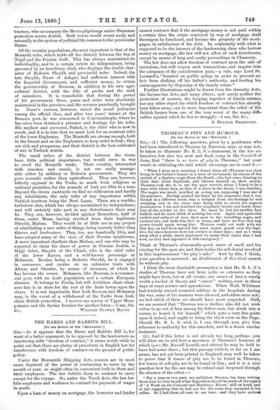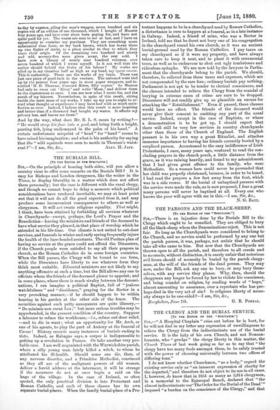THOREAU'S PITY AND HUMOUR.
[TO THE EDITOR OF THE "SPECTATOR:1 SIR,—(1.) The following anecdote, given by a gentleman who had been introduced to Thoreau by Emerson, may, or may not, be taken to illustrate Mr. R. L. S.'s statement, in the too ex- haustive, but also too neat and final, essay in the Corn/till of June, that "there is no trace of pity in Thoreau ;" but your words in criticising the said article encourage me to send it :— " When I went next morning, I found them all (Thoreau was then living in his father's house) in a state of excitement, by reason of the arrival of a fugitive negro from the South, who had come fainting to their door about daybreak, and thrown himself on their mercy. Thoreau took me in to see the poor wretch, whom I found to be a. man with whose face, as that of a slave in the South, I was familiar. The negro was much terrified at seeing me, supposing I was one of his pursuers. Having quieted his fears by the assurance that I, too, though in a different sense, was a refugee from the bondage he was escaping, and at the same time being able to attest the nogro's genuineness, I sat and watched the singularly tender and lowly devo- tion of the scholar to the slave. He must be fed, his swollen feet bathed, and he must think of nothing but rest. Again and again this coolest and calmest of men drew near to the trembling negro, and soothed him and bade him feel at home, and have no fear that any power should again wrong him. Thoreau could not, walk with me that day, as had been agreed, but must mount guard over the fugi- tive, for slave-hunters were not extinct in these days; and so I went away after a while, much impressed by many little traits that I had seen, as they had appeared in this emergency."
Think of Thoreau's abnormally-quick sense of smell and his
craving for the open air, and then realise the self-denial involved in this imprisonment "for pity's sake." And by this, I think,
your question is answered : an Abolitionist of this kind cannot be without pity.
I think the most charitable assumption is that Mr. R. L. S.'s studies of Thoreau have not been quite so extensive as they might have been, but at all events, one ounce of fact is surely worth a bushel of theory and "smart" writing, even in these days of exact science and agnosticism. When Walt Whitman had tenderly nursed wounded soldiers in the hospitals daring the war, some of his enemies were silenced, and others were not; we feel which of them we should have most respected. Still,
we are assured that "Thoreau was a skulker, who did not wish virtue to go out of him among his fellow-men, but slunk into a corner, to hoard it for himself," which puts a very fine point upon it indeed, and ought to bring the blush even on the Page.
Should Mr. R. L. S.. wish it, I can, through you, give him reference to authority for this anecdote, and to a dozen similar instances.
(2.) And if this letter is not already too long, perhaps you will allow me to add here a specimen of Thoreau's humour, of which (pace Mr. Russell Lowell, and others) he may be held to
have had some share ; bat this passage (which, so far as I am aware, has not yet been printed in England) may well be taken to prove that if traces of pity are to be found in Thoreau, few traces of self-pity are to be found in him ; and it is a nice question how far the one may be refined and deepened through the absence of the other :—
"For a year or two past, my publisher, Munroe, lies been writing from time to time to ask what disposition should be made of the copies of A Week on the Concord and Merrimac Rivers' still on hand, and at last suggesting that he had use for the room they occupied in his cellar. Bo I had them all sent to me hero: and they have arrived- to-day by express, piling the man's waggon, seven hundred and six copies out of an edition of one thousand, which I bought of Munroe four years ago, and have ever since been paying for, and have not quite paid for yet. The wares are sent to me at last, and I have an opportunity to examine my purchase. They are something more substantial than fame, as my back knows, which has borne them up two flights of stairs, to a place similar to that to which they trace their origin. Of the remaining two hundred and ninety and odd, seventy-five were given away, the rest sold. I have now a library of nearly nine hundred volumes, over seven hundred of which I wrote myself. Is it not well that the author should behold the fruits of his labour ? My works are piled up in my chamber half as high as my head, my opera mania. This is authorship. These are the works of my brain. There was just one piece of good-lack in the venture. The unbound were tied up by the printer four years ago in stout paper wrappers, and in- scribed D. Thoreau, Concord River, fifty copies.' So Munroe had only to cross out 'River' and write 'Mass.,' and deliver them to the expressman at once. I can see now what I wrote for, and the result of my labours. Nevertheless, in spite of this result, sitting beside the inert mass of my works, I take up my pen to-night to re- cord what thought or experience I may have had with as much satis- faction as ever. Indeed, I believe that this result is more inspiring and better than if a thousand had bought my wares. It affects my privacy less, and leaves me freer."
And by the way, what does Mr. R. L. S. mean by writing P- " He would stoop his lace into a pool, and bring forth a bright, panting fish, lying undismayed in the palm of his hand." A certain unfortunate misprint of " head " for " hand " seems to have seized his imagination; and what is his authority for saying that the "wild squirrels were seen to nestle in Thoreau's waist-



































 Previous page
Previous page